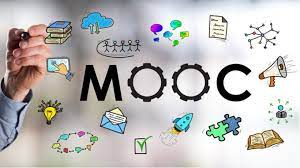When MOOCs turn into Self-Paced eLearning...
It is true that, as of this writing, there is much more serious stuff happening in the world today, both in the US and abroad, but this has been percolating in my brain for a while, so I thought I'd jot down some thoughts on one of my favorite topics: the MOOC.
Now that I am done with my dissertation, and I've had a little time to rest my brain and refocus on what I want to geek out on, I've wanted to do a retrospective piece on MOOCs. I was going to call it a post-mortem because I think that the time of the MOOC has passed. Don't get me wrong, I think there is still gas in the tank of companies like Coursera, Edx, and Futurelearn, but I wouldn't call them MOOCs. The innovative pedagogical stuff I saw early on doesn't quite seem to be there these days, with a focus going to AI, massification, and Machine Learning.
In any case, my idea for a post-mortem was particularly poignant because 2022 is the 10th anniversary of the year of the MOOC (time flies...😮). To be fair, MOOCs existed prior to 2012, with classics like CCK (connectivism and connective knowledge) debuting in 2008 and arguably defining the genre of a MOOC (of the connectivist variety), but as is the case with media, even in academics you need a little popular awareness to spice things up, so the post-mortem would have started from the debut of the xMOOC. If you're interested in a curated collection that provides a retrospective on the decade of MOOCs, check out Katy Jordan's co-edited JIME issue which came out this May.
While I did do some lit-review on the MOOC for my dissertation, the MOOC wasn't the focus of my work, so there was a bit of a gap that I wanted to address for my own personal knowledge, and in turn, use that top-level view to write something. Alas, while I was away the MOOC seems to have turned [even more] into your standard self-paced eLearning 🙄. A learner can log in, view the content provided by the design team, complete some multiple-choice formative and summative assessments, and log out. Sure, in the heyday of the cMOOC it was possible to lurk in a MOOC, get what you wanted to get out of it, and not interact with anyone, however, many people did blog, tweet, and reflect in their own spaces, and that those were aggregated via the MOOC, which allowed other to engage with you in those spaces. There was more content, ideas, and ponderings (and opportunities for connection) permitted in the cMOOC days.
In the xMOOC I tend to avoid the only place for connection, the forum, because it is one huge mess. Contributions get lost in a forum with that many people, and it really is a demotivator when it comes to participation. Why put the effort to write anything cogent when you don't own the platform and people may not read it? To make things worse, mandatory participation by means of forum posts (borrowed, no doubt, from smaller-scale online classes) invites short responses such as "agree" and "nice job!" or, perhaps, a regurgitation of what was in that 10-minute mini-lecture. The xMOOC has tried to be "innovative" by shutting off access to past courses (unless, of course, in some cases, if you subscribe...), so it ratches up FOMO forcing you to participate in what is essentially a self-paced eLearning course.
Of course, when you're focused on "completing" the materials by the end of the access period you cram, and in the end, you remember nothing 🙄. It's just wasted time. Some of my more memorable xMOOCs were ones from the early days of Edx and Coursera where I could sign-up for a variety of courses, and actually treat them as self-paced eLearning without worrying about expiration, and immersing myself in the content (and cMOOCing it a bit by writing about it).
Finally, being the MOOC expert that I am (😅), I am invited to peer review articles on the subject. People seem to be treating MOOCs as a technology, which they are not. People also treat MOOCs as self-paced eLearning or content-dumps, which IMO they shouldn't be. I guess the MOOC has evolved and moved on...or perhaps I've stuck with a more idealistic version of the connectivity variety while financial interests have morphed the MOOC into something that might make money. Either way, I am having more engaging conversations on spaces like MyFest, DS106, and tweetchats than the ecosystem that was once called a MOOC.
So, my question for MOOCers current and past is this: what do you think? Is the MOOC as a concept done? or is there something there that can be salvaged? Or, do we just pick out the parts that we liked and then remix them into something new?🤔



Comments